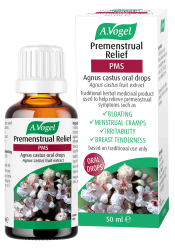An introduction to periods
Periods signal that a woman has reached sexual maturity and is able to bear a child. Nowadays, most women have their first period at around 12 years of age. You will continue to menstruate each month from then on, right up until you reach the menopause and this is when your periods eventually come to an end. The menopause occurs in most women between the ages of 45 and 55. This means that most women will have periods for 30-40 years of their life!
Periods are rarely talked about in public, but they affect all of you women out there, for a huge section of your life, and let’s not forget they often come with a host of symptoms to be dealt with... so really I think it’s about time we start talking about them a bit more.
There are different types of periods from heavy to irregular, from painful to light – often all of these variations of periods are perfectly normal. However, in many cases the symptoms you experience as a result of menstruation can get out of hand, you wrongly assume this is ‘just normal’ and as a result you find yourself putting up with the physical and emotional turmoil they can so easily bring.
Throughout these pages I want to assist in addressing this issue as I aim to describe what’s normal and when it’s time to take some action against troublesome periods.
What causes your period?
Hormones called sex hormones are involved in the menstrual cycle and are responsible for giving you your period each month. Rising levels of the main female sex hormones oestrogen and progesterone (with the help of another couple called luteinizing hormone and follicle-stimulating hormone) initiate ovulation. This is followed by preparation of the womb in the second half of your cycle.
During ovulation an egg is released from your ovaries and starts travelling down your fallopian tube towards the womb in anticipation of being fertilized. Meanwhile, your womb is busy becoming thick and spongy, ready for the fertilized egg to become implanted.
However, if your egg doesn’t become fertilized, your hormones rapidly decline and as a result of this, the lining of your womb is shed (you don’t need it this time and it will thicken again next month) and leaves through the vagina. This is called your period.
Your womb contracts in order to successfully shed its lining (often why cramp can be felt near the start of your period) and women generally menstruate for 4-5 days on average.
After your last period ends, oestrogen and progesterone begin to rise and the whole cycle starts all over again. Each menstrual cycle lasts for 28 days on average.
Symptoms of periods
Periods aren’t always plain sailing and each woman is different. In many cases, fluctuating hormones (together with other influencing factors) can give rise to a host of physical, mental and behavioural symptoms. Everything from stomach cramps to mood swings can make an appearance which many women have come to accept.
Click the links above to learn more about the symptoms of periods and what might be causing them. By understanding the causes of these symptoms it can help you better manage them month to month.
However, if you find that your symptoms are getting the better of you and affecting your day to day life, for example if they are affecting relationships or your work performance, then you may be suffering from what we call premenstrual syndrome (PMS). Click the link to learn more about PMS – what causes it and what can be done to help.
How to have a happy period
So what can you do to help minimise the symptoms you experience each month?
Firstly, it is important to be aware of all of the options available to you. There are many different sanitary products available to make your period as fuss free as possible.
As you are now able to get pregnant it’s also important to know what methods of contraception there are available: many of these can have an impact on your period (both good and bad!) so it’s important you are able to make an informed choice.
Some lifestyle factors are also key in order to have a relatively painless menstrual period (quite literally).
Eat a balanced, varied diet, drink plenty of water and take part in regular moderate exercise for starters. Your periods can be influenced by a whole host of factors and even making small lifestyle changes can drastically improve your symptoms.
In many cases, especially if a hormone imbalance is apparent (which is surprisingly common), herbal remedies can really help.
Click the following link to read my blog to learn more on ‘how to have a happy period’ and begin implementing all of my top tips.





 Looking for our products in a store near you?
Looking for our products in a store near you?

